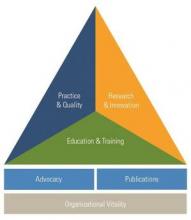I’m proud to share with you the new strategic plan of the American Gastroenterological Association (AGA). Thanks to the hundreds of members who worked to ensure that the plan is responsive to the needs of thousands in the gastroenterology community and their patients.
Throughout the process of developing the strategic plan, the phrase “start something that matters1” echoed through my head. In 1897, a group of physicians started the AGA to make a difference in the lives of their colleagues and their patients. Since that time, AGA has been the driving force behind advances that matter in gastroenterology and hepatology research and practice. We have made staggering scientific discoveries and applied them to improve patient care. However, we still have so much more to learn, and that’s why the AGA Strategic Plan matters.
AGA, at our heart, is a learning organization. This new strategic plan will lead us to new discoveries in GI science, new tools to improve patient care, new ways to educate ourselves and the gastroenterologists of the future. Together we will shape a bright future for gastroenterology and our patients.
Ultimately, the AGA Strategic Plan will mobilize the resources of our organization to fulfill our mission of advancing the science and practice of gastroenterology.
Overview of the plan
Two words describe each of the 3 fundamental AGA areas as illustrated in the triangular portion of the plan (Figure 1). For example practice and quality were paired intentionally to emphasize their close connection and the AGA’s increasing commitment to increasing the “value” (defined as quality per unit cost) of our GI and liver care.
Research is critical to our advancing science, but needs to be coupled with AGA’s commitment to promote innovation in medical device and therapeutic advances, through the AGA Center for GI Innovation and Technology and the AGA Center for Diagnostics and Therapeutics.
Finally, education must be paired with training our physician and provider workforce in new and emerging technologies. The plan includes specific reference to patients. Throughout the four goals and supporting strategies, patient engagement, patient voice and patient experience all are emphasized.
AGA Strategic Plan at a glance
Practice & quality
Define optimal clinical practice and help gastroenterologists provide high-quality, high-value care.
• Within the framework of the Triple Aim, define high value care for GI disorders.
• Increase the number of gastroenterologists reporting on quality of care.
• Build and engage an active grassroots network to communicate and advise AGA of emerging practice issues and trends.
• Address evolving practice and reimbursement models in all practice settings.
Research & innovation
Foster scientific discovery and the application of new knowledge to improve care of patients with digestive disease.
• Target junior faculty engaged in research for special support.
• Increase strategic innovation and research collaborations to promote high-value clinical care.
• Support promising advances in research and innovation.
Education & training
Engage members and other GI health providers through personalized education across the continuum of their careers.
• Help members satisfy requirements for certification, recertification, continuing medical education and licensure.
• Educate members about emerging technologies, procedures and scientific discoveries to improve patient care.
• Help members and other learners develop their careers and navigate transitions.
• Use state-of-the-art and innovative technology platforms for learning.
Advocacy
Influence public policies to support quality patient care, improve the practice of gastroenterology, and advance digestive disease research and education.
• Pursue policies that ensure patients have access to appropriate, affordable, high-value GI care.
• Increase opportunities for funding digestive disease research.
• Develop a grassroots network to advocate for improvements in patient care, increased research funding and the viability of GI practice.
• Strongly advocate for sufficient federal funding of academic training programs.
Publications
Lead the GI/hepatology category of scientific journals in rank, reach and accessibility while meeting the readership needs of basic and clinical investigators, practitioners, young GIs and trainees.
• Achieve and maintain high impact factors for all journals.
• Rank highest in the field for meeting the readership needs of basic and clinical investigators, practitioners, young GIs and trainees.
• Expand journals’ reach via new content dissemination technologies.
• Increase usage of the journals’ digital platforms.
Organizational vitality
Maintain a robust and diverse membership, develop society leaders, foster strategic collaborations, and maintain an infrastructure that supports AGA mission and goals.
• Increase AGA’s membership.
• Develop a sustainable global strategy.



